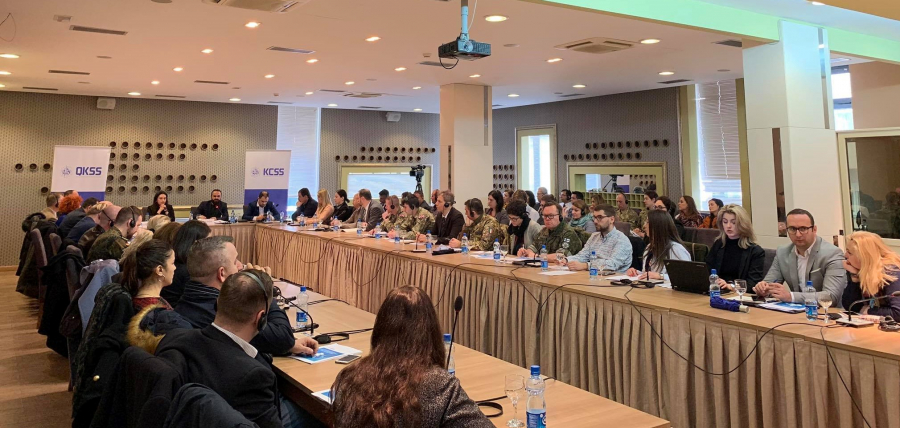12/04/2021

Kosovar Centre for Security Studies (KCSS), with the support of the International Republican Institute (IRI), has launched today the research report on: "An overview of Kosovo’s approaches of deradicalization and reintegration of returnees from the war zones in Syria and Iraq".
The findings of the report shows that Kosovo is one of the few countries ready to repatriate its citizens from Syria and Iraq. The report also shows that while the government has established the necessary institutional mechanisms to coordinate and manage the reintegration of returnees, there is a lack of coherent policy and there are significant challenges in terms of coordination and involvement of civil society in the process.
At the opening of the conference on the occasion of the publication of the report, Teuta Avdimetaj from KCSS said that it is estimated that about 403 Kosovars have joined various militant groups in Syria and Iraq. Further Mrs. Avdimetaj said the collapse of the infamous terrorist organization ISIS has created a new situation for many European countries, including Kosovo, as to what to do with their citizens remaining in Syria and Iraq.
Therefore, according to Ms. Avdimetaj, the Kosovar Centre for Security Studies with the support of the International Republican Institute, did research on the subject. The main purpose of the report, published today, is to analyze how the government and other stakeholders have responded to the issue of repatriating Kosovars from the war zones in Syria and Iraq, and how their reintegration into society has been supported.
Skender Perteshi, a researcher at KCSS, and one of the authors of the report, said that in terms of support for reintegration of returnees, the report's findings include two general approaches. There are punitive-restorative measures and support for social reintegration.
The Kosovo Correctional Service has established special programs to support the rehabilitation and de-radicalization of those returnees from the war zones in Syria and Iraq who are in prison. These include skills development courses to increase their chances of employment after release, various other training, as well as religious lectures by imams provided by the Kosovo Islamic Community.
With regard to social reintegration support, the Government has established a specialized division within the Ministry of Internal Affairs to manage and coordinate support for reintegration of returnees from war zones in Syria and Iraq. While the government's approach has been positive, Mr. Pertesh argues that there is a lack of a coherent policy and that there are challenges with coordination.
From the policy perspective, the government should:
1) Conduct e comprehensive review of the policies and institutions that coordinate and implement activities aimed at supporting reintegration of returnees from the war zones;
2) Adopt a concept-document on how to reorganize the existing institutional mechanism dealing with deradicalization and reintegration and establish a coherent government policy on social and economic reintegration of returnees. Such a document needs to consider also if the placement of the DPRRP in Ministry of Internal Affairs is most suitable option for its task, considering that MLSW is the primary holder of resources the DPRRP would require to support social reintegration;
3) Conduct a review into efforts of deradicalization of foreign fighters that are incarcerated in the Kosovo Correctional Service, as well as examine the extent to which the lectures from sanctioned Islamic Community imams have had any impact, and modify existing arrangement;
4) Ministry of Internal Affairs should establish the Civil Society Reintegration Advisory Group in order to include NGOs in reintegration efforts through partnership with government institutions.
For more please find the report HERE
This report is published in the framework of the project "Analyzing the reintegration process of returned foreign fighters back to the community” supported by International Republican Institute (IRI). The views expressed in this research do not necessarily represent those of the IRI.